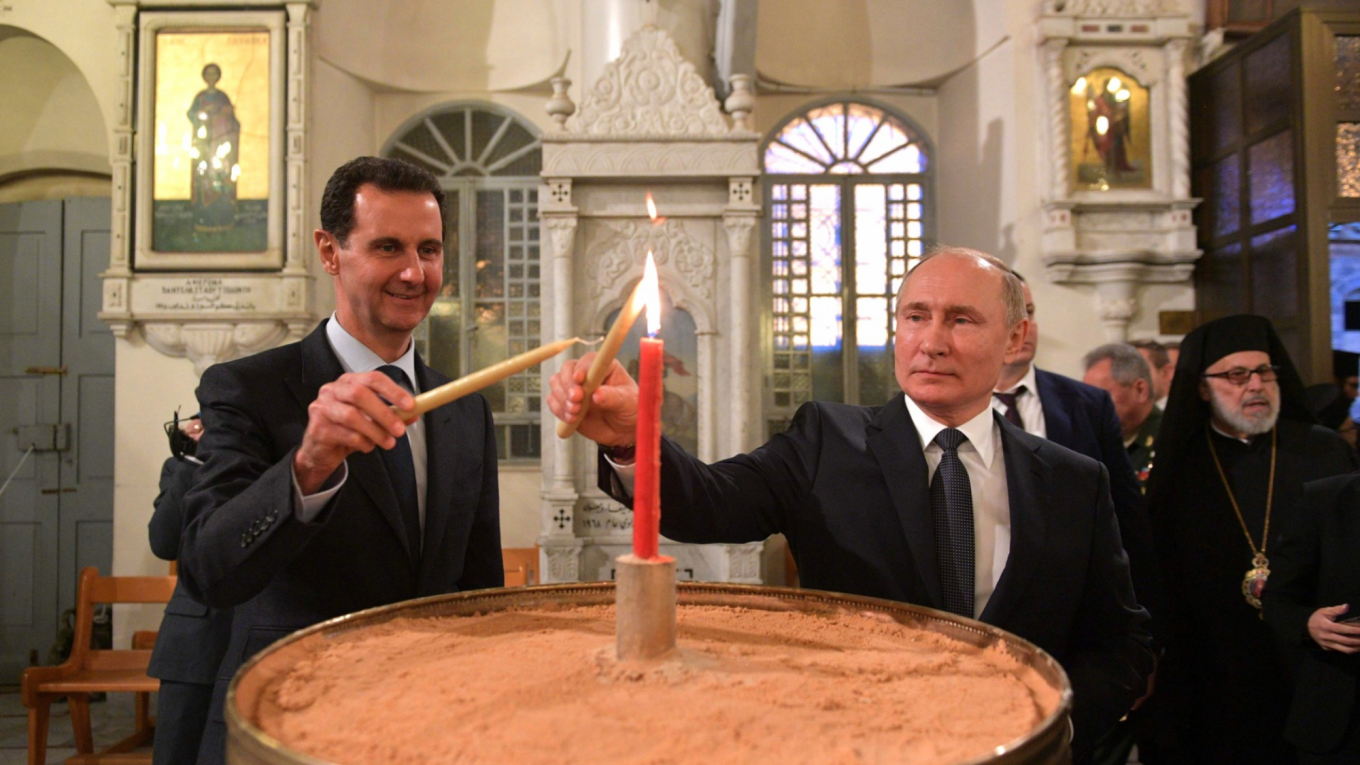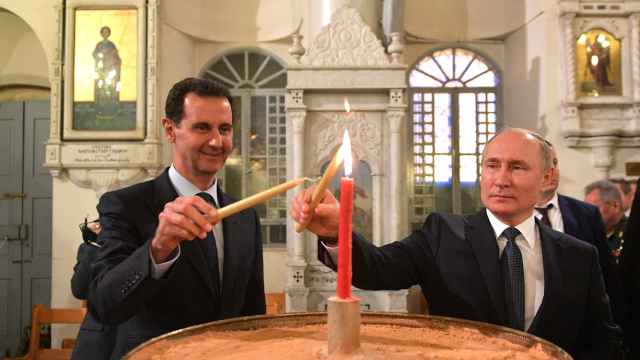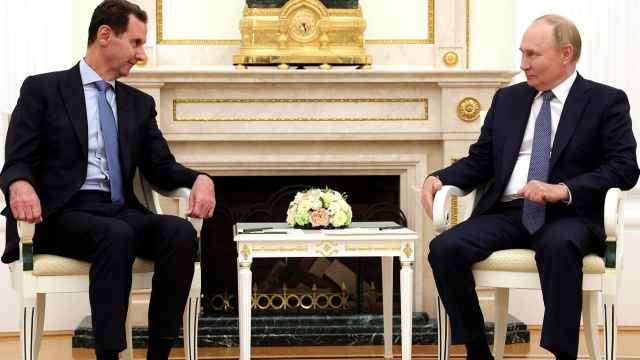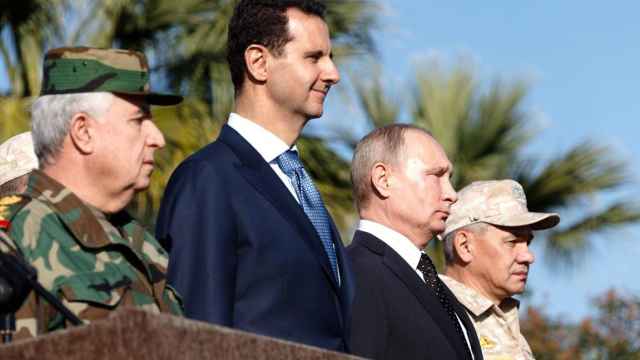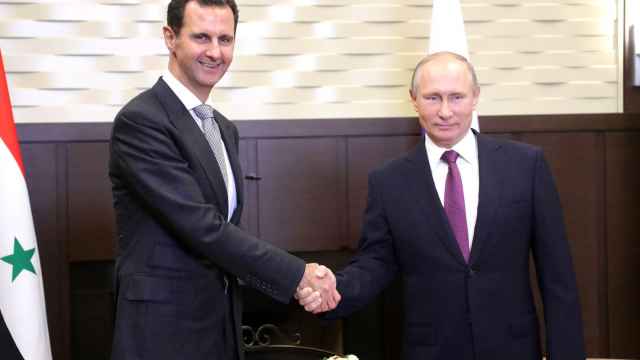With the world on edge over rising tensions in the Middle East, one leader seems unfazed: Russia’s Vladimir Putin.
The Russian president arrived in Damascus on Tuesday in just his second visit to Syria since the start of the country’s civil war nearly nine years ago.
The timing is significant. The U.S. and its allies are assessing the damage after Iran fired a series of missiles at U.S.-Iraqi airbases early Wednesday in retaliation for the killing of Tehran’s top general Qassem Soleimani. Markets are on edge and uncertainty reigns over the continued U.S. military presence in Iraq.
But Putin is pushing ahead with his own agenda in the region. The Russian president traveled from the Damascus airport to a command post of Russian forces where he met his counterpart and ally Bashar al-Assad.
“This is a clear signal to allies and opponents that when stability declines and risks rise, when uncertainty appears, Russia underlines that its presence in the Middle East is unchanging, unlike the U.S.,” said Andrey Kortunov, director of the Russian International Affairs Council, a group with close ties to the Kremlin. “In contrast to Donald Trump’s unpredictability, Russia’s consistency becomes advantageous.”
Russia’s 2015 military intervention in the Syrian conflict was not only key in saving the Assad regime but heralded the arrival of a new powerbroker in an already volatile and crowded region. The visit was planned in advance of a Wednesday meeting with Turkey’s Recep Tayipp Erdogan, another leader who has entered the fray with his incursion in Libya.
Turkey is a NATO member, but has been courted with increasing success by Putin in recent years as Erdogan drifts further from his country’s historic allies in Europe and the U.S.
With events in Iran monopolizing global attention, there is the risk of other significant developments falling under the radar, such as the capture of the coastal city of Sirte by Libyan military commander Khalifa Haftar. It has a symbolic and strategic value for Haftar — supported by Russia — and could determine the fate of a country that has been in trapped in a cycle of civil war ever since Western allies toppled dictator Moammar Qaddafi back in 2011.
Back in Washington, the U.S. sent its own signals that it hasn’t lost its focus on the rest of the world.
Secretary of State Michael Pompeo began a relatively rare news conference on Tuesday by mentioning wildfires in Australia, China’s standoff with Hong Kong protesters, Iran’s role in Afghanistan, the plight of Uighurs in Xinjiang, political upheaval in Venezuela and a visit by Greece’s prime minister. He even detailed his undersecretary of state’s travel plans to Europe.
At the White House, Trump met the Greek prime minister, Kyriakos Mitsotakis, who said the U.S. could always count on his country as “a reliable and predictable ally.”
But that meeting only underscored how Iran was still foremost on the president’s mind.
After Iran’s missile strikes were announced, Trump tweeted “All is well!” and “So far, so good!” Earlier, as Mitsotakis looked on, Trump said of Soleimani: “We saved a lot of lives by terminating his life,” Other countries were “extremely happy” with the U.S. attack, Trump added.
Russia wasn’t one of those nations. The country’s defense ministry called Soleimani’s assassination a “short-sighted” step that will lead to a “sharp escalation” of tensions. Soleimani, the ministry said, was a “a competent military leader, who had a well-deserved authority and significant influence throughout the Middle East.”
This article was first published by Bloomberg.
A Message from The Moscow Times:
Dear readers,
We are facing unprecedented challenges. Russia's Prosecutor General's Office has designated The Moscow Times as an "undesirable" organization, criminalizing our work and putting our staff at risk of prosecution. This follows our earlier unjust labeling as a "foreign agent."
These actions are direct attempts to silence independent journalism in Russia. The authorities claim our work "discredits the decisions of the Russian leadership." We see things differently: we strive to provide accurate, unbiased reporting on Russia.
We, the journalists of The Moscow Times, refuse to be silenced. But to continue our work, we need your help.
Your support, no matter how small, makes a world of difference. If you can, please support us monthly starting from just $2. It's quick to set up, and every contribution makes a significant impact.
By supporting The Moscow Times, you're defending open, independent journalism in the face of repression. Thank you for standing with us.
Remind me later.


